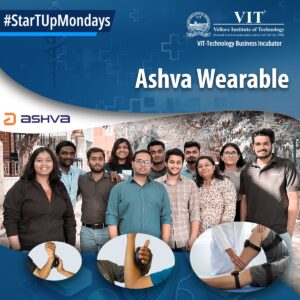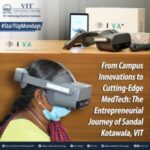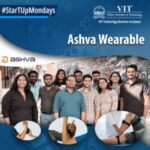N. Ramakrishnan
Anmol Ajay Saxena says she was always prone to knee injuries, especially when she was studying Electrical and Electronics Engineering at VIT Vellore. She had also seen her mother struggle with knee problems and physiotherapy. On completing her engineering degree, she got a job with Ford Motor Company in the audio-infotainment segment as a product and quality engineer in Chennai. This gave her an idea of the different stages of product development, especially in a large corporation such as Ford. She also learnt about quality related issues and how they are handled across the hierarchy and how customer feedback is valued. All this was important training for the venture she had in mind.
She used her experience in knee related problems and participated in a hackathon where she created a prototype to measure whether a person is overloading the knee joint and give a prompt to the user that he or she is putting excess weight on the knee joint. After she quit Ford, she worked with more than 50 physiotherapists and orthopaedic doctors to better understand the problem. That was also when she realised that knee related problems and injuries were widely prevalent and was increasing every year, so much so that nearly a fourth of adults suffered knee pain in some form or the other. And, this number was only increasing every year. “I realised that there is a loophole in the market, especially at the early stage of the knee pain. If we give early knee pain intervention, a lot of problems can be solved at that stage itself and aggravation can be prevented,” says Anmol.
She founded Ashva Wearable Technologies, which will celebrate its fifth year in a month, to come out with a product to solve for knee problems. The product she has developed, FitKnees, is a wearable device. “It is like a smart watch for the knees,” says Anmol. The device has four motion sensors that are strapped on to the thigh and shin and is connected via Bluetooth to an Android tablet. Ashva has developed an application on the tablet that can be used only by a physiotherapist or an orthopaedic doctor. When a person with knee related problems consults a physiotherapist or an orthopaedic doctor, the person will undergo a physical examination with the device strapped on. Once the physical examination is over, a detailed analytical report will be available, which Ashva calls a Kneeport. The report provides various vital information for the physiotherapist or doctor to base their treatment on. This includes range of motion of the joint, muscle strength, balance, walking posture and whether the person has stiffness while climbing stairs. The device quantifies the data points that offer insights that are not available on an X-ray or an MRI scan, says Anmol. “Our device will be able to tell you the root cause of the problem through an AI engine. Along with that, it will give other parameters that are not normal, such as exactly which muscle group is the cause of the problem. This will help in giving pin-point treatment,” adds Anmol.
According to her, Ashva has patented the technology. The hardware, software and the AI engine are all proprietary. The company has obtained patents in the UK and Hong Kong and patent approval is pending in other countries, including in India and the US. The company’s clients are premium physiotherapy centres and orthopaedic hospitals with strong physiotherapy departments. “We launched the product in October 2022. We have sold nearly 100 products so far in six major cities,” she says.
The company has one other product that it sells. It complements FitKnees. Muscle strength is an important aspect of what FitKnees does, but muscle strength is also important for a lot of other aspects, especially for athletes. Ashva did a simple design tweak to the muscle strength device called FitMust. This hand-held device quantifies the strength of a person’s muscle and helps measure the strength against the normal range and what is the difference between the normal range and the person’s muscle strength. While FitMust is an important component of FitKnees, Ashva sells it as a standalone product too. In the pipeline, says Anmol, are products for knee rehabilitation games.
She says all this development in the company would not have been possible without the initial support of VIT TBI (VIT Technology Business Incubator), where Ashva was incubated. She got incubated at VIT TBI immediately after she quit Ford in 2019, where the company continued to be for over two years before moving out. “They gave us a lot of grants, plenty of student and faculty connections, and, more importantly, put us in touch with hospitals,” says Anmol. There was plenty of early support. Thanks to VIT TBI, the company was able to raise a lot of grant funding, particularly NIDHI PRAYAS (National Initiative for Developing and Harnessing Innovations – PRomotion and Acceleration of Young and Aspiring technology entrepreneurs) from the Department of Science and Technology of the Government of India. The company has got a few grants and also equity funding from a couple of investors.
According to Anmol, thanks to being incubated at VIT TBI, Ashva, a hardware company, was able to get access to a lot of laboratory infrastructure, which otherwise would have been extremely difficult for it or, even if it did, would have been expensive. They helped the company a lot in developing the sensors, motherboard, test them, get them 3D printed. The office space at VIT TBI was an added bonus. “Our first hires happened from VIT. We were able to get a lot of interns from VIT. The early-stage research and development part was easily navigated thanks to VIT TBI,” says Anmol. VIT TBI continues to help them with connections with industry experts and hospitals. Anmol says she was in Germany recently and Dr. A. Balachandran, Director, VIT TBI, was able to help her get in touch with an industry expert there with regards to production. Ashva is based in Bengaluru and has a 13-member team. (EOM).










